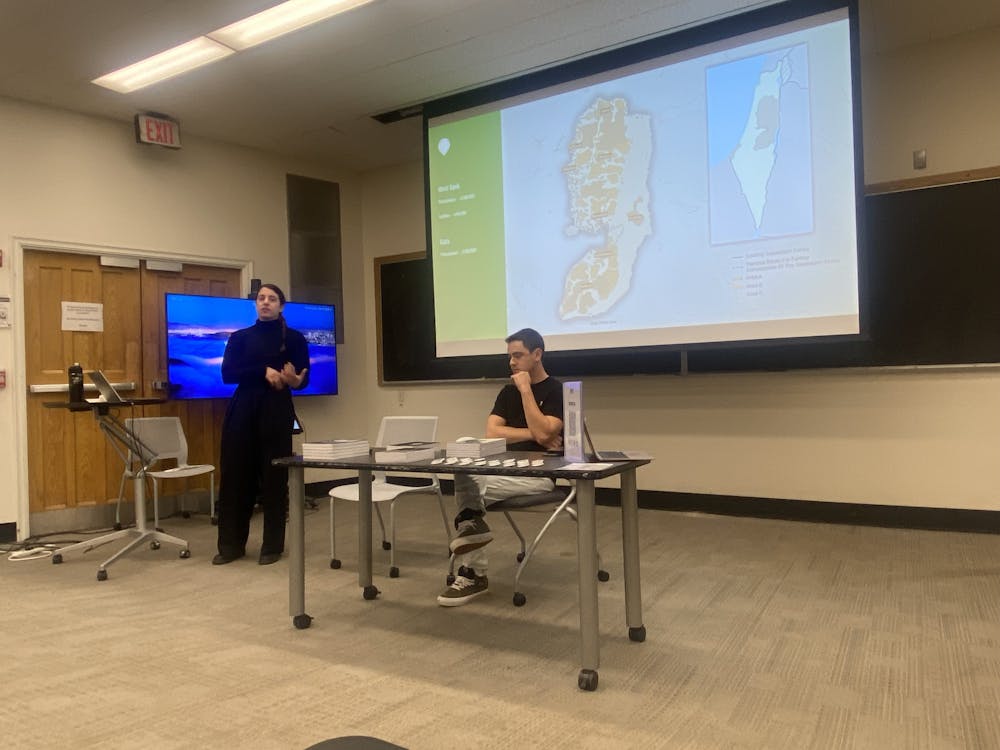Former Israel Defense Forces soldiers Tal Sagi and Luiz Aberbuj, members of anti-occupation organization Breaking the Silence, spoke at a Wednesday event organized by the Duke chapter of J Street U.
Sagi, educational director for Breaking the Silence, and Aberbuj, the organization’s Jewish diaspora educational coordinator, discussed how their experiences serving in the IDF shaped their perspective of Israeli occupation in the Palestinian territories.
Breaking the Silence is an organization founded in 2004 in the aftermath of the Second Intifada. Sagi described it as a group of former IDF soldiers sharing their experiences from their service to raise awareness and discuss the “moral cost of the occupation.”
“Our main goal is to end occupation and we believe that the first step should be that people will talk about it and will understand the price that Israelis and Palestinians are paying for the situation of ongoing military control for so many years,” Sagi said.
Israel has occupied and built settlements throughout the Palestinian territories — including the West Bank, East Jerusalem and the Gaza Strip — since 1967, though settlements in the Gaza Strip were dismantled in 2005. The Biden administration’s current policy, announced in February, says that Israeli settlements in the West Bank are “inconsistent with international law.”
Sagi grew up in a right-wing, Orthodox Jewish family in a West Bank settlement. When people called her a settler, she denied their accusations but did not know what a settlement meant.
Without any means to understand what settlements were, Sagi grew up not asking questions about settlements and never conversed with the Palestinian neighbors who lived close to her home.
Sagi said that she served as a soldier in Hebron, one of the largest cities in the West Bank. The Palestinian Authority administers the majority of the city, while the Israeli military controls a section consisting of nearly 340,000 Palestinians and 850 Jewish settlers.
Sagi described being a soldier in Hebron as “pretty extreme, but for me, it was normal,” saying that she was used to seeing soldiers, military posts and fences separating the Palestinian neighborhoods from the settlements.
However, Sagi recalled being visited by her close friends who got angry with her when she gave them a tour of Hebron. That was when Sagi began to realize what exactly she was participating in.
“I'm standing in the middle of this huge Palestinian city, every few meters on that street soldiers with weapons,” Sagi said. “... All the Palestinian neighborhoods around me, I don't see the Palestinians — I don't meet them on the streets and they’re not allowed to walk on the street.”
“I have no idea that the city is under military control, while I'm taking part of this military control,” she continued.
Aberbuj, on the other hand, grew up in Porto Algere, home to Brazil’s third-largest Jewish community. Growing up as an involved member in his community, Aberbuj joined a Zionist socialist youth movement, which he called “the most impactful element of [his] Jewish life in Brazil.”
Later, Aberbuj immigrated to Israel and became the first member of his family to join the IDF. His experiences serving as a soldier in Hebron also changed his views on the occupation.
While he was against the Israeli military occupation, Aberbuj initially viewed his service in the IDF as part of a desire to protect Israeli civilians and save lives.
“Then I found myself stopping children in the middle of the street,” he said. “And that really bothered me because it was completely against the motivation that brought me to the situation.”
Aberbuj stated that the most important decision the organization took since Oct. 7 was to start having more conversations about the situation in Gaza. He highlighted the “power balance” between Israel and the Palestinians, stating that Israel has “a lot more influence and power to really bring change.”
He called the claim that Gaza is its own state with an independent political structure and government since Israel’s disengagement in Gaza in 2005 “completely untrue,” arguing that Israel’s siege of Gaza is fundamentally an occupation.
Aberbuj highlighted what he calls the three principles that guide IDF activity in the West Bank and their implications. The first principle is that the IDF is the “sovereign power” in the area, and soldiers see Palestinians as either involved in terrorist activities or not. Aberbuj said that this perception therefore defined Palestinians as “potential threats” that need to be stopped.
The second principle is “presence demonstration,” which is achieved through settlements, checkpoints and putting soldiers on the ground to emphasize that “we can settle here, we can live here.”
The last principle is “settler violence” and how it relates to soldiers serving in settlements. Aberbuj recalled his experiences of trying to prevent Israeli children from provoking Palestinians. The children quickly turned on him, calling him a “leftist Israel hater that came to protect the Arabs.”
Sagi emphasized the importance of conversations that constructively move the Israeli-Palestinian issue forward.
“We need to understand that we’re here to stay … Israelis will not disappear, Palestinians will not just disappear, as a lot of Israelis are saying about Gaza now,” she said. “We’re here, and we need to figure out how we’re living together — and it’s urgent, because more blood, more killing won’t help us.”
Get The Chronicle straight to your inbox
Signup for our weekly newsletter. Cancel at any time.
Ishita Vaid is a Trinity junior and a senior editor of The Chronicle's 120th volume.

